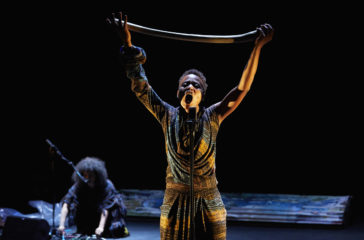“How do you dance after rape and trauma? How do you sing after genocide? How can we speak about what is taboo and remember that which is unbearably painful, and many would prefer us to forget? Those are some of the questions explored by performer and choreographer Dorothée Munyaneza in UNWANTED.
Created with the singer Holland Andrews and composer Alain Mahé who share the stage with her, UNWANTED – which arrives at the In Between Time Summit in Bristol having toured all over the world – gives a voice and a space to some of the women survivors of the Rwandan genocide. Between April and July 1994 at least 800,000 people from the Tutsi minority were murdered by members of the Hutu majority. In some cases, neighbour turned upon neighbour, family member upon family member.
Many female survivors were raped, and some gave birth to children. They bear the burden of what Munyaneza calls “a double condemnation”. First, they were violated and then they were rejected by their own families who wouldn’t accept them because they had the “enemy’s” babies growing inside of them. These women are often lonely and isolated.
“They carry this trauma in their bodies and when I am on stage, I am trying to portray it, so I am not just performing it, but living it. I see myself as a vessel of these testimonies.” Some who have seen UNWANTED have spoken of how it feels as if Munyaneza acts like a medium channeling the experiences of women whose stories have been silenced.
“Arts has the power and the task of addressing the dark silences and the holes in our history,” says Munyaneza, “but the question for the artists must be how we do this without abusing those who tell us their stories and using them and their stories only as supporting material for our work. We must constantly ask ourselves why we are exploring this trauma, where is it rooted and how are we going about it in a way that is generous, truthful and authentic. We must take care of people’s stories.”
“We must constantly ask ourselves why we are exploring this trauma, where is it rooted and how are we going about it in a way that is generous, truthful and authentic. We must take care of people’s stories.” Dorothée Munyaneza
Researching UNWANTED took Munyaneza back to her native Rwanda, which she left in 1994 aged 12 to move with her family to the UK, although she now lives in Marseilles. She feels that she has a right to tell these stories because “I know the trauma of being a genocide survivor and losing people you love, friends, neighbours and family members. I carry it in my body and my mind, and I carry it into my work which is about addressing memory and how through art we can memorialise.” It is a subject that Munyaneza has previously addressed in Samedi Détente about her own childhood memories and Rwanda’s collective memory of genocide.
“I know the trauma of being a genocide survivor and losing people you love, friends, neighbours and family members. I carry it in my body and my mind, and I carry it into my work which is about addressing memory and how through art we can memorialise.” Dorothée Munyaneza
She quotes her friend, the South African artist, Hiengiwe Lushaba Madlala, who “always talks of how it is our work as artists to mend what is broken.” Munyaneza argues that it is part of an artist’s responsibility, adding “I’m an artist not a psychotherapist or a politician and art is the space I want to occupy and can occupy. I can try to create a space of healing and of questioning and bearing witness that can begin healing and unveil issues that have been kept hidden. It is art that can disturb the comfortable, those who are too easy with themselves and the world.”
In Rwanda, with the help of Godelievé Mukasarasi, who runs an NGO called Sevota which works with women rape survivors, Munyaneza met with women in rural areas who had borne children as a consequence of rape.
“I spent hours listening to them because listening to them is what needs to happen, and with their permission I recorded their voices because I wanted their testimonies to be the guiding thread. I wanted their voices to be heard, not taken away from them. So, every time I perform UNWANTED we hear their voices and I translate them from my mother tongue live on stage. They are present with us in every performance.”
"Every time I perform UNWANTED we hear their voices and I translate them from my mother tongue live on stage. They are present with us in every performance.” Dorothée Munyaneza
They are also present in the contribution of composer and singer Holland Andrews who creates a soundscape and mixes her vocals to create a choir of female voices. It is necessary because although UNWANTED focusses on Rwandan rape survivors, violence against women is, as Munyaneza points out, global, particularly in war, and extends across all borders. This is not just a Rwandan story about some women in one particular place but the story of many women in many places.
“So many places where we go to with UNWANTED, afterwards women come up and tell us that this is their story too,” says Munyaneza. “People tells ‘I went through this.’ It breaks the silence. In Chile, where the violence that women experienced during the Pinochet regime and the children born of those rapes is still a secret, women who saw it felt they could at last talk about what is taboo.”
This is not just a Rwandan story about some women in one particular place but the story of many women in many places.
Back in Rwanda during her research trip, after Munyaneza had listened to the women’s testimonies she always asked if she could take a photograph of them.
“They would wash their faces and change into beautiful garments and I would almost tremble with admiration to see this transformation. They had offered me their most painful testimony but they wanted me to take away their beauty and see that somehow they were still standing or were seeking to stand. Even those who, when I asked them if they accepted themselves and had re-appropriated their bodies, said that it felt as if they were carrying a stone in their spine that stopped them from standing completely upright. These women have such beauty, such dignity and it raises questions about how do you transform what is supposed to destroy you. I am interested in beauty as a weapon of resilience.”
Munyaneza incorporates that into her choreography which pushes her own body to the limits, and it is also present in the onstage metal figures created by plastic artist Bruce Clarke which portray a towering woman standing and another lying down. “They represent all the women who are still standing, and reminds of all those who cannot stand because they have been victims of those who use women’s bodies to destroy the social fabric and the community. It happened in Rwanda and it is happening in Syria.”
Munyaneza sees herself not just as an artist but also as an activist and both recognises the privilege she has in being able to tell the stories of these Rwandan women and the importance of remembering and commemorating, always alert to the need to stop these stories from slipping back out of sight. She thinks it is part of the role of the artist because she says that when a young Syrian asks her what she was doing when Assad was laying waste to his own people, she needs to have an answer.
Munyaneza sees herself not just as an artist but also as an activist and both recognises the privilege she has in being able to tell the stories of these Rwandan women and the importance of remembering and commemorating, always alert to the need to stop these stories from slipping back out of sight.
‘For me doing UNWANTED is my answer. It is my gesture not just to the genocide survivors of Rwanda, but the violence people are going through wherever they live.” She quotes Nina Simone: it is an artist’s duty to reflect the times.
“I am not there just to entertain. Of course, activism can be entertaining, but for me performance is about getting attention and making change. It is not enough for the audience to just feel empathy, because what am I going to do with their empathy? What is important to me is that when the audience leaves the space something has shifted. I don’t want them to leave and just forget. What I do during the performance is plant the seeds, but after the performance they must water the plant. Each one of us has a responsibility, not just the artist. Empathy is important because it makes us feel, but it is what happens after empathy that is more important. How does the performance change how I live today but also how I will live tomorrow?”
Written by Lyn Gardner
Unwanted © Christophe Raynaud de Lage
As part of FranceDance UK, a UK-wide festival of contemporary Dance presented by the Institut français du Royaume-Uni.







